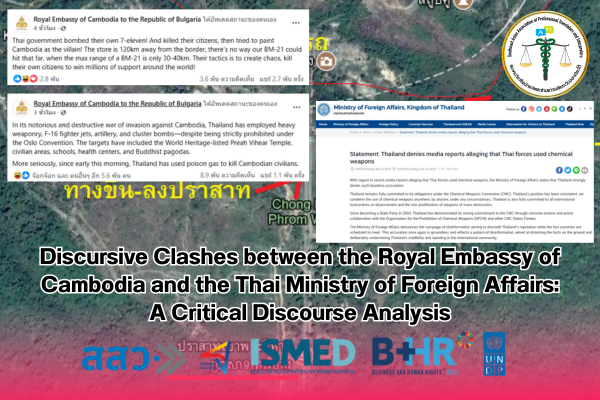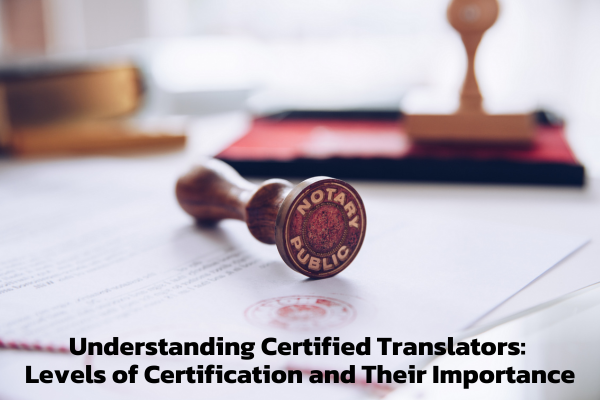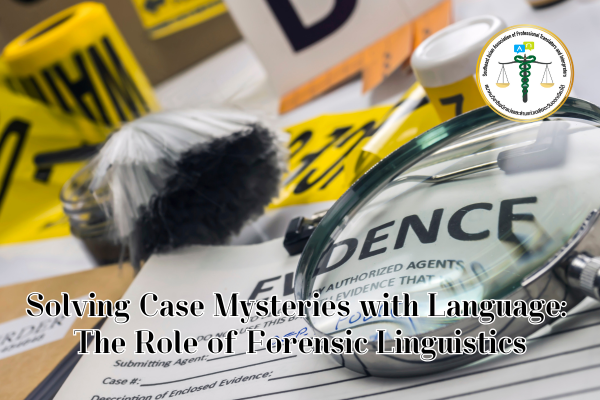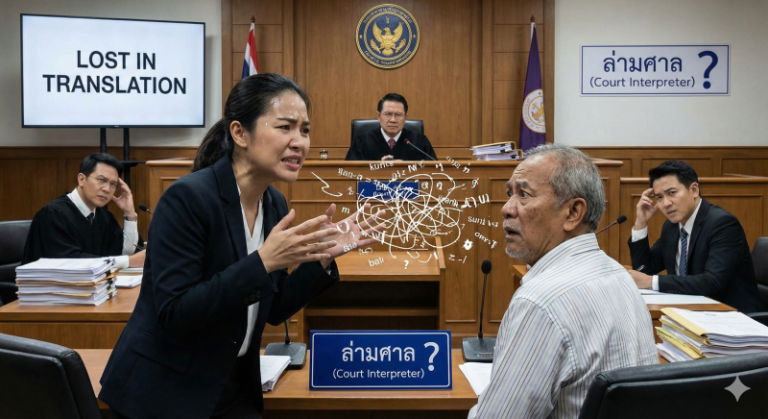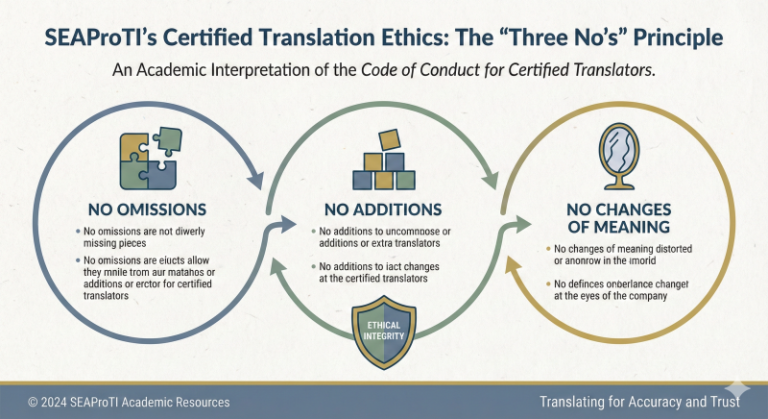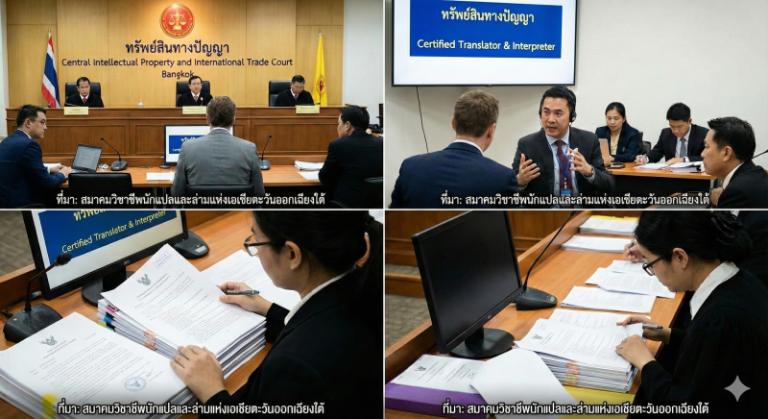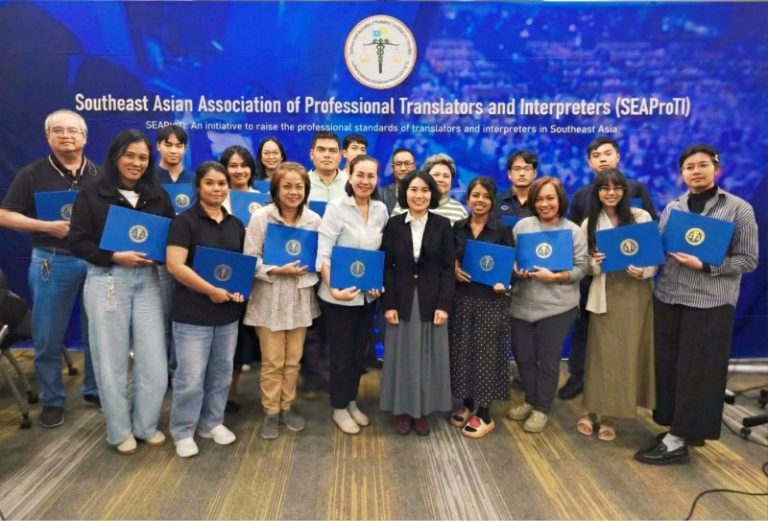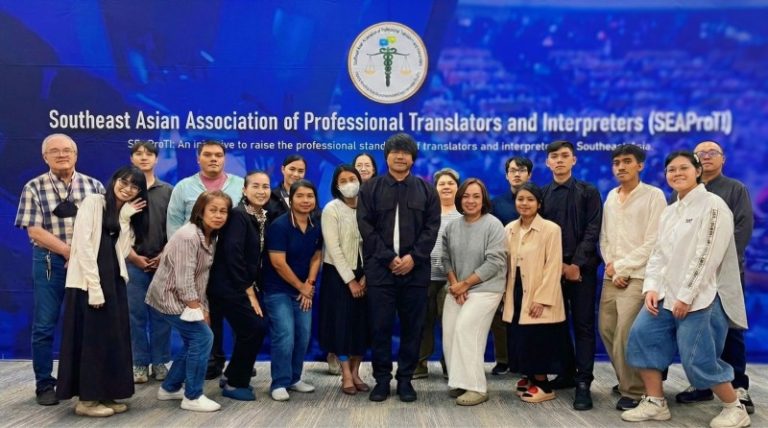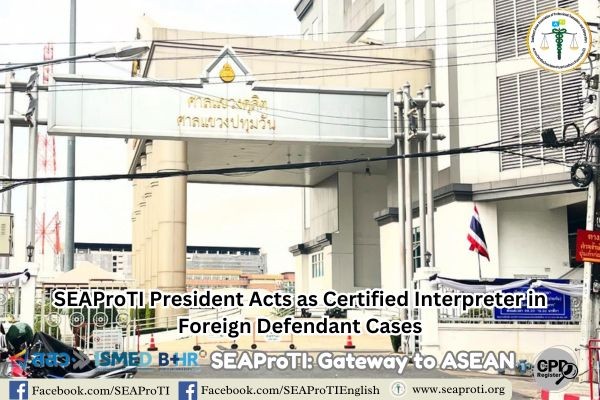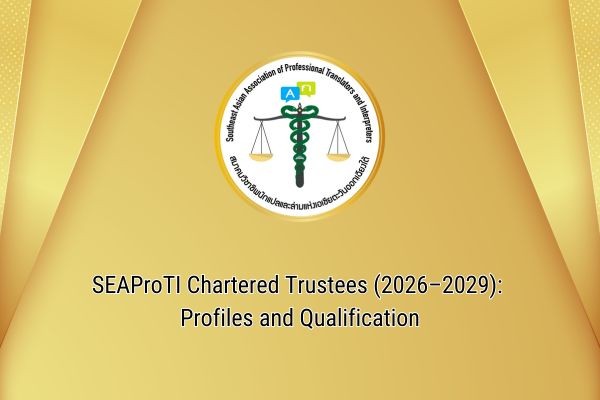Discursive Clashes between the Royal Embassy of Cambodia and the Thai Ministry of Foreign Affairs:
A Critical Discourse Analysis
By Wanitcha Sumanat, President, Southeast Asian Association of Professional Translators and Interpreters (SEAProTI)
28 July 2025, Bangkok — This article presents a critical discourse analysis of the official statements issued by the Royal Embassy of Cambodia to the Republic of Bulgaria and the Ministry of Foreign Affairs of Thailand in response to a border conflict that escalated in July 2025. The analysis employs the Critical Discourse Analysis (CDA) framework proposed by Fairclough and van Dijk to demonstrate how both governments used discourse to frame the situation, construct an “us versus them” dichotomy, and legitimize their positions. It also highlights how such language strategies form part of an ongoing information war that is as influential as physical armed conflict.
Introduction
When physical confrontation arises between states, strategic communication often becomes an essential tool for securing moral legitimacy in the eyes of the international community. The recent escalation between Cambodia and Thailand in July 2025 demonstrates how both states leveraged discourse to assert their positions, particularly regarding allegations of chemical weapons use and attacks on civilian zones.
Theoretical Framework
This study is grounded in the CDA framework of Fairclough (1992, 1995), who emphasizes the relationship between discourse, power, and social structure. His model consists of three interrelated levels: text, discursive practice, and social practice. The work of van Dijk (1998, 2006) is also central, especially his analysis of how language serves ideological functions by creating binary oppositions, such as “us” versus “them,” and reinforcing stereotyping through discursive structures.
Data Analysis
The analysis focuses on two key documents published on 28 July 2025: (1) the statement from the Royal Embassy of Cambodia to the Republic of Bulgaria, and (2) the response from the Thai Ministry of Foreign Affairs. These texts serve as discursive instruments that reflect political interests, power dynamics, and attempts at controlling international perception.
Cambodian Statement
The Cambodian embassy’s statement includes highly assertive language, accusing Thailand of acts of aggression and violations of international law:
- “Thailand has employed heavy weaponry, F-16 fighter jets, artillery, and cluster bombs… Thailand has used poison gas to kill Cambodian civilians… Their tactics is to create chaos, kill their own citizens to win millions of support around the world.”
Such language—including terms like “notorious and destructive war of invasion”, “poison gas”, and the extraordinary claim that Thailand “bombed their own 7-eleven”—clearly aims to construct Thailand as a rogue state. These accusations invoke breaches of international law, notably the Oslo Convention (on cluster munitions) and the Chemical Weapons Convention (CWC).
The statement also references culturally and morally sensitive locations such as the Preah Vihear Temple, schools, pagodas, and health centers. This rhetorical strategy, known as moral shock, aims to elicit emotional responses and mobilize sympathy from the global public.
Thai Response
The Thai Ministry of Foreign Affairs responded with a diplomatic tone grounded in legal rationality and institutional alignment:
- “Thailand strongly denies such baseless accusation… Thailand is fully committed to its obligations under the Chemical Weapons Convention… This accusation once again is groundless and reflects a pattern of disinformation…”
Thailand’s language emphasizes its commitment to international norms and treaties, especially through references to the CWC and cooperation with the Organisation for the Prohibition of Chemical Weapons (OPCW). This signals a strategy of institutional credibility building.
Words such as “disinformation”, “baseless accusation”, and “deliberately undermining Thailand’s credibility” reframe Cambodia’s statement as politically motivated misinformation, thus reversing the legitimacy claim and positioning Thailand as a law-abiding state under unjust attack.
Discourse Analysis Summary
| Discursive Element | Cambodia | Thailand |
|---|---|---|
| Framing | War of invasion | Unfounded accusation |
| Ideology | Victimized innocence | Responsible international actor |
| Us–Them Construction | Thailand as the aggressor | Cambodia as a disinformation source |
| Legitimation Strategy | Appeals to human rights and emotionality | Appeals to legal obligations and institutions |
| Strategic Objective | Construct victimhood to gain support | Defend national image and reputation |
Both discourses are clearly designed to shape international perception and compete for symbolic power. These rhetorical strategies align with the logic of information warfare, in which states use discourse as a tactical weapon on the global stage.
Conclusion
The respective statements from Cambodia and Thailand reflect more than simple diplomatic responses—they represent strategic attempts to define the narrative, assert moral legitimacy, and influence global opinion. By invoking international norms (such as the CWC and OPCW) and employing ideologically charged rhetoric, both parties reveal how discourse functions as a powerful political instrument. In today’s geopolitical context, language and information operate not only as reflections of conflict but as active components in warfare. Understanding these discursive dynamics is essential to analyzing contemporary international disputes and their broader implications.
References
- Fairclough, N. (1992). Discourse and Social Change. Cambridge: Polity Press.
- Fairclough, N. (1995). Critical Discourse Analysis: The Critical Study of Language. London: Longman.
- van Dijk, T. A. (1998). Ideology: A Multidisciplinary Approach. London: Sage.
- van Dijk, T. A. (2006). Discourse and manipulation. Discourse & Society, 17(3), 359–383.
- Ministry of Foreign Affairs of Thailand. (2025, July 28). Statement: Thailand denies media reports alleging that Thai forces used chemical weapons. https://www.mfa.go.th
- Royal Embassy of Cambodia to the Republic of Bulgaria. (2025, July 28). Statement on Thai aggression and alleged use of chemical weapons [Media release].
SEAProTI’s certified translators, translation certification providers, and certified interpreters:
The Southeast Asian Association of Professional Translators and Interpreters (SEAProTI) has officially announced the criteria and qualifications for individuals to register as “Certified Translators,” “Translation Certification Providers,” and “Certified Interpreters” under the association’s regulations. These guidelines are detailed in Sections 9 and 10 of the Royal Thai Government Gazette, issued by the Secretariat of the Cabinet under the Office of the Prime Minister of the Kingdom of Thailand, dated July 25, 2024, Volume 141, Part 66 Ng, Page 100. The Royal Thai Government Gazette
วาทกรรมการปะทะกันผ่านข่าวสารระหว่างสถานทูตกัมพูชาและกระทรวงการต่างประเทศไทย:
การวิเคราะห์เชิงวาทกรรมวิพากษ์ (Critical Discourse Analysis)
โดย วณิชชา สุมานัส นายกสมาคมวิชาชีพนักแปลและล่ามแห่งเอเชียตะวันออกเฉียงใต้ (SEAProTI)
28 กรกฎาคม 2568, กรุงเทพมหานคร – บทความนี้นำเสนอการวิเคราะห์วาทกรรมของรัฐบาลกัมพูชาและไทยที่ตอบโต้กันผ่านถ้อยแถลงของ Royal Embassy of Cambodia to the Republic of Bulgaria และการตอบโต้ของ กระทรวงการต่างประเทศไทย ผ่านกรอบ Critical Discourse Analysis (CDA) สามารถแยกพิจารณา วันที่ 28 กรกฎาคม พ.ศ. 2568 โดยใช้กรอบแนวคิดวาทกรรมวิเคราะห์เชิงวิพากษ์ (Critical Discourse Analysis – CDA) ตามแนวทางของ Fairclough และ van Dijk บทความชี้ให้เห็นถึงการใช้วาทกรรมเพื่อวางกรอบความหมายของสถานการณ์ แยกขั้ว “พวกเรา–พวกเขา” และสร้างความชอบธรรมผ่านกลไกภาษาที่มีเป้าหมายในการควบคุมความรับรู้ของประชาคมระหว่างประเทศ ทั้งนี้ บทความยังสะท้อนให้เห็นถึงการทำสงครามข้อมูลข่าวสาร (information warfare) ที่มีอิทธิพลไม่น้อยไปกว่าการใช้กำลังทางทหาร
บทนำ
เมื่อความขัดแย้งทางกายภาพปะทุขึ้นระหว่างรัฐ การตอบโต้ในระดับข่าวสารมักกลายเป็นเครื่องมือสำคัญในการชิงพื้นที่ความชอบธรรมในสายตาของประชาคมโลก กรณีข้อพิพาทล่าสุดระหว่างกัมพูชาและไทยในเดือนกรกฎาคม พ.ศ. 2568 แสดงให้เห็นการใช้วาทกรรมเชิงกลยุทธ์โดยรัฐบาลของทั้งสองประเทศ โดยเฉพาะอย่างยิ่งในประเด็นเกี่ยวกับข้อกล่าวหาเรื่องการใช้อาวุธเคมีและการโจมตีพื้นที่พลเรือน
กรอบแนวคิดทางทฤษฎี
บทความนี้อิงการวิเคราะห์ตามแนวทางของ Fairclough (1992, 1995) ซึ่งเสนอว่าวาทกรรมมีความสัมพันธ์กับอำนาจและโครงสร้างทางสังคม โดยการวิเคราะห์แบ่งออกเป็นสามระดับ ได้แก่ ระดับข้อความ (text), การปฏิบัติของวาทกรรม (discursive practice), และบริบททางสังคม (social practice) รวมถึงแนวคิดของ van Dijk (1998, 2006) เกี่ยวกับการควบคุมทางอุดมการณ์ผ่านภาษา โดยเน้นความสัมพันธ์ระหว่างภาษา การแบ่งขั้ว “พวกเรา–พวกเขา” และการสร้างความคิดแบบเหมารวม (stereotyping)
ข้อมูลวิเคราะห์
การวิเคราะห์ถ้อยแถลงของ Royal Embassy of Cambodia to the Republic of Bulgaria และการตอบโต้ของ กระทรวงการต่างประเทศไทย ผ่านกรอบ Critical Discourse Analysis (CDA) สามารถแยกพิจารณา
ถ้อยแถลงของกัมพูชา
สถานเอกอัครราชทูตกัมพูชาประจำสาธารณรัฐบัลแกเรียได้เผยแพร่ถ้อยแถลงในวันที่ 28 กรกฎาคม 2568 ซึ่งมีเนื้อหาเชิงรุกและกล่าวหาว่า:
- “Thailand has employed heavy weaponry, F-16 fighter jets, artillery, and cluster bombs… Thailand has used poison gas to kill Cambodian civilians… Their tactics is to create chaos, kill their own citizens to win millions of support around the world.”
การใช้ถ้อยคำที่รุนแรง เช่น “notorious and destructive war of invasion”, “poison gas”, และการกล่าวหาไทยว่า “bombed their own 7-eleven” สื่อถึงการวางกรอบให้ไทยเป็น รัฐอาชญากร (rogue state) ที่ละเมิดกฎหมายระหว่างประเทศ เช่น อนุสัญญาออสโล (Oslo Convention) และอนุสัญญาว่าด้วยอาวุธเคมี (CWC)
การกล่าวถึงสถานที่ศักดิ์สิทธิ์ เช่น Preah Vihear Temple, โรงเรียน, วัด และศูนย์สุขภาพ เป็นการใช้ moral shock เพื่อสร้างความเห็นอกเห็นใจและปลุกเร้าอารมณ์จากประชาคมโลก
ถ้อยแถลงตอบโต้ของไทย
กระทรวงการต่างประเทศไทยได้ตอบโต้ด้วยถ้อยแถลงที่มีความเป็นทางการและเน้นหลักนิติรัฐ:
- “Thailand strongly denies such baseless accusation… Thailand is fully committed to its obligations under the Chemical Weapons Convention… This accusation once again is groundless and reflects a pattern of disinformation…”
การเน้นความผูกพันกับ CWC และการทำงานร่วมกับ OPCW แสดงถึงการใช้วาทกรรมแบบ institutional alignment หรือการอ้างอิงถึงกลไกสากลเพื่อเสริมความน่าเชื่อถือ
คำว่า “disinformation”, “baseless accusation”, และ “deliberately undermining Thailand’s credibility” ชี้ให้เห็นถึงความพยายามในการหักล้างและตอกกลับฝ่ายตรงข้ามว่าใช้ “สงครามข่าวสาร” เพื่อลดความน่าเชื่อถือของไทยในเวทีโลก
4. การวิเคราะห์เชิงวาทกรรม
| องค์ประกอบ | กัมพูชา | ไทย |
|---|---|---|
| Framing | สงครามรุกราน | ข้อกล่าวหาบิดเบือน |
| อุดมการณ์ (Ideology) | ผู้บริสุทธิ์ถูกกระทำ | รัฐที่มีความรับผิดชอบ |
| การสร้างขั้ว (Us–Them) | ไทยคือผู้รุกราน | กัมพูชาคือผู้ใช้ข่าวเท็จ |
| ความชอบธรรม | อ้างสิทธิมนุษยชน | อ้างพันธกรณีระหว่างประเทศ |
| วัตถุประสงค์หลัก | สร้างภาพเหยื่อ เรียกร้องการสนับสนุน | ปกป้องภาพลักษณ์ของรัฐ |
วาทกรรมของทั้งสองฝ่ายแสดงออกถึง “การแข่งขันด้านการสื่อสาร” ที่มุ่งแย่งชิงความได้เปรียบในทางจิตวิทยาและการเมืองระหว่างประเทศ ซึ่งเป็นลักษณะเด่นของ สงครามข้อมูล (information warfare) ที่มิได้ใช้เพียงอาวุธแต่ใช้ถ้อยคำเป็นเครื่องมือ
บทสรุป
ถ้อยแถลงของทั้งรัฐบาลกัมพูชาและไทยในการตอบโต้ข้อกล่าวหาครั้งนี้เผยให้เห็นการใช้วาทกรรมเพื่อวางกรอบความหมาย แบ่งขั้วทางอุดมการณ์ และควบคุมการรับรู้ของผู้ชมในระดับนานาชาติ โดยเฉพาะเมื่อมีการอ้างอิงถึงองค์กรระหว่างประเทศ เช่น CWC และ OPCW สะท้อนให้เห็นว่าในบริบทของความขัดแย้งสมัยใหม่ ภาษาและข้อมูลกลายเป็นอาวุธทางยุทธศาสตร์ไม่แพ้อาวุธทางกายภาพ การเข้าใจและวิเคราะห์วาทกรรมจึงเป็นเครื่องมือสำคัญในการทำความเข้าใจภูมิรัฐศาสตร์ร่วมสมัย
บรรณานุกรม
- Fairclough, N. (1992). Discourse and Social Change. Cambridge: Polity Press.
- Fairclough, N. (1995). Critical Discourse Analysis: The Critical Study of Language. London: Longman.
- van Dijk, T. A. (1998). Ideology: A Multidisciplinary Approach. London: Sage.
- van Dijk, T. A. (2006). Discourse and manipulation. Discourse & Society, 17(3), 359–383.
- Ministry of Foreign Affairs of Thailand. (2025, July 28). Statement: Thailand denies media reports alleging that Thai forces used chemical weapons. https://www.mfa.go.th
- Royal Embassy of Cambodia to the Republic of Bulgaria. (2025, July 28). Statement on Thai aggression and alleged use of chemical weapons [Media release].
เกี่ยวกับนักแปลรับรอง ผู้รับรองการแปล และล่ามรับรองของสมาคมวิชาชีพนักแปลและล่ามแห่งเอเชียตะวันออกเฉียงใต้
สมาคมวิชาชีพนักแปลและล่ามแห่งเอเชียตะวันออกเฉียงใต้ (SEAProTI) ได้ประกาศหลักเกณฑ์และคุณสมบัติผู้ที่ขึ้นทะเบียนเป็น “นักแปลรับรอง (Certified Translators) และผู้รับรองการแปล (Translation Certification Providers) และล่ามรับรอง (Certified Interpreters)” ของสมาคม หมวดที่ 9 และหมวดที่ 10 ในราชกิจจานุเบกษา ของสำนักเลขาธิการคณะรัฐมนตรี ในสำนักนายกรัฐมนตรี แห่งราชอาณาจักรไทย ลงวันที่ 25 ก.ค. 2567 เล่มที่ 141 ตอนที่ 66 ง หน้า 100 อ่านฉบับเต็มได้ที่: นักแปลรับรอง ผู้รับรองการแปล และล่ามรับรอง


